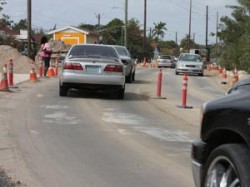 No evidence of waste, inefficiency and unnecessary cost to the public was ever brought before the Public Accounts Committee (PAC) during its probe into the New Providence Road Improvement Project (NPRIP), said a minority report prepared by government representatives on the committee.
No evidence of waste, inefficiency and unnecessary cost to the public was ever brought before the Public Accounts Committee (PAC) during its probe into the New Providence Road Improvement Project (NPRIP), said a minority report prepared by government representatives on the committee.
Kwasi Thompson, Pineridge MP and one of two government members on the committee, presented the minority report during a heated session of Parliament yesterday.
The minority report hit out at findings presented by the PAC in its final review, which was tabled in the House of Assembly on Monday.
The minority report said the PAC’s majority members – who are all opposition MPs – ignored chunks of testimony presented to the group.
The report also charged that the PAC’s findings – the result of three months of meetings with officials involved with NPRIP – were partisan and politically motivated.
The substantive report of the Public Accounts Committee tabled on Monday found that there were several factors that hindered the project – some of which could have been avoided, including a failure to prepare a schedule of issues, design delays, delays caused by inadequate staffing and the poor coordination of utilities.
However, the minority report said while a project the size and magnitude of NPRIP would inevitably face delays, many of these setbacks – such as sink holes, weather conditions and unknown ground conditions – were ‘unavoidable’.
Thompson also said the Ministry of Works did all it could to prevent delays and that the majority members “chose to ignore such evidence” when it concluded its investigation.
The majority members of the PAC also found in some instances that there was poor quality of work. However, the minority report said government officials pointed out shoddy work and pressed the contractor to fix it.
“Evidence shows that there were concerns with the quality of work in certain cases. The engineers which advised the government were obligated to point out substandard work and hold the contractor accountable,” the minority report said.
“In fact, evidence shows that engineers who were the watchdogs continued to press the contractor about the quality of work. This ensures that the public receives proper value for money.”
The minority report also said that the Water and Sewerage Corporation brought cases of substandard work to the attention of the contractor and refused to approve the work.
“If this caused delays, it was the fault of the contractor and the government ensured that the work was done properly,” said the report.
The minority report also said there was no evidence to link the NPRIP to negative effects on local businesses.
“The PAC did not hear from a single witness that could give direct evidence on the effects of the project on local businesses,” the report said. “The conclusion of the majority members of the PAC on this matter is baseless and only expresses their political bias toward the government.”
At a press conference held after the morning session of Parliament, Dr. Nottage said he did not disagree with a minority report being tabled, but said the avenue that Thompson took circumvented the House of Assembly’s rules.
He also said Thompson and Clifton MP Kendal Wright, who is also on the PAC, missed the last few meetings of the committee.
Nottage said neither men responded to requests to add input into the PAC’s final report.
Elizabeth MP Ryan Pinder stood by the committee’s findings that millions of taxpayer dollars could have been saved if the government took out a hedge against fluctuating commodity prices.
He estimated that around $36 million could have been saved had government taken this security measure.
The government will have to come up with an additional $77 million in order to complete the controversial project, which is grossly over budget and behind schedule, Prime Minister Hubert Ingraham revealed Monday.


